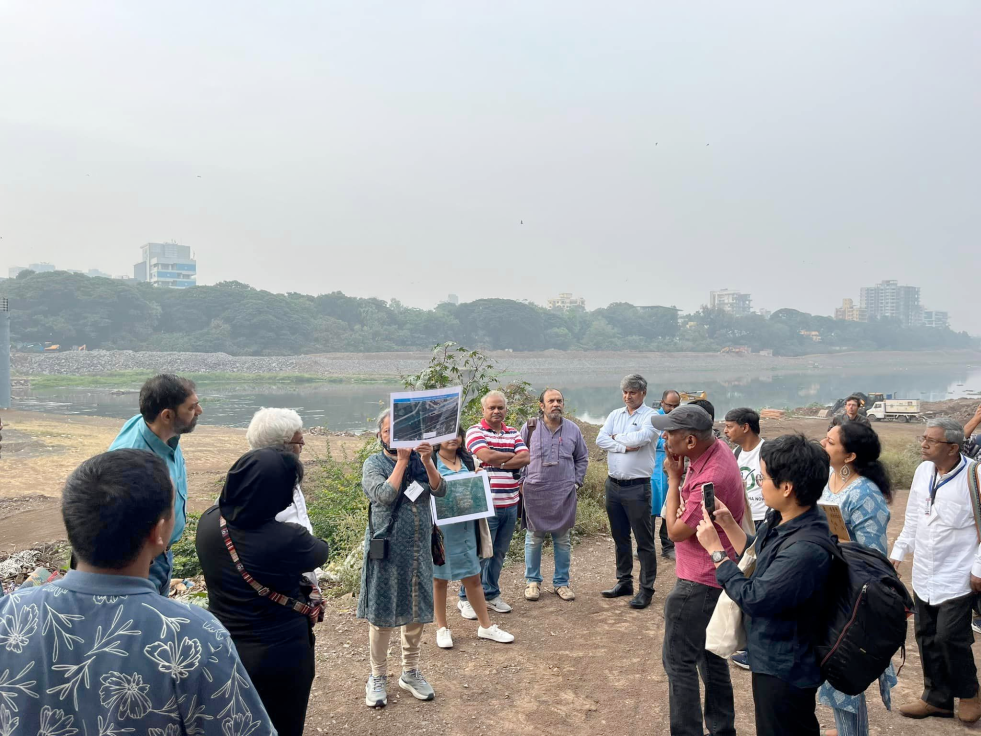India Rivers Forum (IRF) is a vibrant and active network of organizations and individuals that is committed to the conservation and safeguarding of our rivers against needless and detrimental development. Every year IRF organizes the India Rivers Week (IRW) to raise awareness regarding these issues. This year IRW, organized in Pune, brought together more than 100 practitioners, including representatives from academia and civil society movements, to discuss River Front Development (RFD) unfolding in different parts of the country.
RFDs have been promoted in a big way by the central and state governments across the country in the name of rejuvenating and beautifying the rivers. Some of the prominent sites for RFD projects across India are Varanasi, Bhagalpur, Jaipur, Ahmedabad, Vadodara, Hyderabad, Jammu, Kota, Bilaspur, Patna, Guwahati and Pune. Though RFD aims to revitalize the riverfront areas in reality these projects are less about river restoration and more about the encroachment of floodplains and riverbeds characterized by heavily concretized embankments and other structures like barrages and also reclaiming floodplains and riverbeds for real estate development. The Pune RFD project follows the same trajectory. As part of the programme, the participants visited a few sites in the Mula-Mutha system where RFD has been taken up and saw for themselves what is being developed under the name of river rejuvenation.
River with its banks, meanders and riparian zones performs various ecological and geo-physical functions and provides social and economic services. It provides diverse habitat for numerous aquatic, semi-aquatic and terrestrial flora and fauna. Converting it into a concrete channel having a homogenous depth is against the very spirit of ecological integrity and restoration. It is well known from the global scientific knowledge and experience that a river can only retain its ecological functions and services when its natural and heterogenous habitats are maintained and supported.
This public statement, which has been unanimously agreed by participants of India Rivers Week 2023, brings out the fact the RFD in its present form will raise the flood levels steeply, destroy the ecological integrity of the rivers and jeopardize the communities whose lives and livelihoods are dependent on rivers. It calls for an immediate halt of the ongoing works and activities under the project and constitute a multi-disciplinary independent expert group (including representation from civil society organizations) to study all aspects of the project in a participatory and consultative manner and come up with an alternative design which is ecologically and socially just.
We have serious concerns regarding claims made by the project stated below:
Provide Flood Control: Topographically, the Pune metropolitan region is prone to heavy flood risk. With more than 20% of the floodplains already encroached, breaching both the 25-year and 100- year flood lines across the city, construction of embankments and barrages on the Prohibitive Zone under the RFD project would further constrict the rivers, reducing their carrying capacity leading to an increase in the flood risk. There is no room for the rivers to absorb floods under this project, especially considering that the Pune region is going to experience an increase in rainfall due to climate change and existing encroachments.
Make Rivers Pollution-Free: The project for providing pollution-free rivers given to the Japanese International Cooperation Agency (JICA) for the construction of additional Sewage Treatment Plants (STPs) remains lingering for last many years. Not a single STP has been constructed to date. Moreover, the designed capacities of the STPs do not take into account the increased domestic effluent load due to the increase in the population over the last decade. There is no credible governance in place to ensure proper functioning of existing STP capacity.
Retain and replenish water: Water will be retained behind the barrages for recreational purposes. In reality, the rivers will lose their filtration abilities and the rivers will become more stagnant and polluted. Retention of water in the barrages will reduce flows and affect the downstream ecosystems and water users. This may increase water conflicts in future. It is also at the cost of a loss of large amount of trees and biodiversity.
The current PRDP project lacks a holistic approach that takes into account the long-term effects of development on the riverine ecology. We are for genuine rejuvenation of the rivers, but not the present project and the manner it is being implemented presently. The Pune group working on the Mula-Mutha rivers has shown that an alternative, nature-based way for the rejuvenation of the rivers is possible. We sincerely urge the Pune Municipal Corporation to seriously consider this alternative approach.
Our key demands are:
- Stop work on PRDP and initiate independent assessment of alternatives.
- No cutting of the trees in any riparian zone for any infrastructure project.
- Retention of native flora and habitats, including large and older riparian trees. Not removing them for RFD should become policy and part of guidelines for ecological restoration of urban rivers.
- Natural riparian zones should not be disturbed. Wetlands must be protected.
- Aquifers and natural springs must be protected.
- Ban on dumping of construction debris and solid waste in the rivers and along the banks must be enforced more stringently.
- Social audit of the existing water treatment plants regarding their functioning and efficiency.
- Rivers should be given more room. A Cumulative Impact Assessment study should be done to understand the overall effect of the runoffs under extreme storm events.
- Cross section of the riverbed should not be allowed to alter. This should be monitored and put in public domain annually.
- There should be a consideration of equity and social justice in water availability and distribution– water for every living being from source regions to downstream.
Statement adopted unanimously by the participants of India Rivers Week 2023, held at Pune on Nov 25-26 2023.
On behalf of India Rivers Forum
K. J. Joy (9766247320), Shripad Dharmadhikary (9552526472), Siddharth Agarwal (8100170707), Neha Bhadbhade (9158735383)
